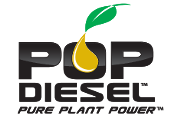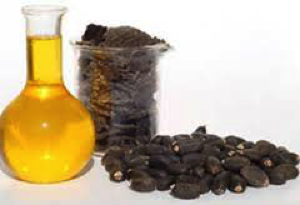
Frequently Asked Questions
Why does 100% jatropha plant oil give better engine performance than petroleum diesel fuel?
Due to the molecular structure of the jatropha plant hydrocarbon oil, as compared to petroleum hydrocarbon oil (i.e., hydrocarbon molecules concentrated over a narrower range), a diesel engine runs more quietly and smoothly on 100% jatropha plant oil. With less racket, the engine sustains less wear and tear and its longevity improves. In addition, jatropha plant oil contains superior lubricity to petroleum diesel fuel such that a lubricity additive is not necessary. Better lubricity minimizes wear on the parts of the engine that come into contact with the fuel. Lastly, jatropha plant oil has superior cetane to petroleum diesel.
What is the POP Diesel Fuel System?
The POP Diesel Fuel System is a patented and EPA-approved auxiliary (secondary) fuel system that enables a diesel engine to run on straight vegetable oil. The POP Diesel Fuel System contains only four moving parts. It does not modify the engine or the original engine fuel system. The POP Diesel Fuel System uses a coolant and electric heating system that is controlled by an onboard computer to regulate the supply from the petrodiesel fuel tank and the plant oil fuel tank to maximize performance and safeguard the diesel engine's longevity.
How does the POP Diesel Fuel System enable 100% plant oil to power an engine?
Once the POP Diesel Fuel System has been added to an engine, the driver starts and drives the vehicle normally. From start-up, the engine runs on petrodiesel. The POP Diesel Onboard Computer monitors coolant and fuel temperatures and when the engine reaches a safe operating temperature, usually after 10 to 15 minutes, the Computer switches the POP Diesel Tri-Valve Manifold to allow the flow of 100% plant oil, instead of petrodiesel, to the engine. When the driver turns off the ignition key, the Computer keeps the engine running and automatically switches back to petrodiesel to purge the engine's fuel system of plant oil and replace it with petrodiesel for the next start. Then the Computer shuts off the engine.
How long does the engine take from a cold start for the POP Diesel Onboard Computer to switch the fuel supply from petrodiesel to 100% plant oil?
During most of the year, the POP Diesel Fuel System will enable the switch-over to take place in 10 to 15 minutes; in wintertime, the switch-over time will be slightly longer. The POP Diesel Fuel System has been proven to function effectively in temperatures below 0° F. If there is ever a fault in system operation, it simply and automatically reverts to normal operation on No. 2 petroleum diesel.
Will engine performance diminish after an engine is fitted with a POP Diesel Fuel System?
No. A POP Diesel Fuel System operating on POP Diesel Fuel retains at least the lifetime performance expected of the vehicle's original equipment. POP Diesel has gone to great lengths to configure a fuel system and manufacture parts that are specifically designed for vegetable oil fuel. Use of clean and safe POP Diesel Fuel is necessary to ensure maximum lifetime performance.
Is the POP Diesel Fuel System safe for an engine?
Yes. The POP Diesel Fuel System has been designed and engineered from top to bottom specifically for the unique qualities of 100% plant oil. The POP Diesel Double Pass Filter, POP Diesel Tri-Valve Manifold, POP Diesel Electric In-line Heater, and POP Diesel Onboard Computer, which are all covered in part by POP Diesel's patents, work together to monitor and control fuel temperature and monitor engine speed, coolant temperature, and fuel pressure to intelligently manage both the petrodiesel and plant oil diesel fuel supplies.
Does 100% plant oil affect an engine's power?
Because 100% plant oil has 10% lower energy or heat content than petrodiesel, it takes 10% more plant oil by volume or mass to travel the same distance and perform the same amount of work. However, power output from a POP Diesel-equipped engine remains the same. The engine also runs more smoothly and quietly.
Will operating an engine on 100% plant oil reduce fuel mileage?
Yes, but this should not make a difference for the following reasons. The oxygen present in plant oil molecules gives this fuel around 10% less energy content than No. 2 petroleum diesel. It reduces fuel economy accordingly. However, power output from a POP Diesel-equipped engine remains the same and POP Diesel assures customers of $0.50 per gallon in real savings, compared to No. 2 petroleum diesel, despite having to use 10% more plant oil fuel to travel the same distance or perform the same amount of work.
What's the story behind vegetable oil as an engine fuel?
Rudolf Diesel, the inventor of the highly efficient engine that bears his name, originally designed it to run on peanut oil to allow farmers to grow their own fuel. The modern diesel engine can still operate on oil derived from plants and animal fat, though addition of an alternative fuel system, cleansing of the oil, and treating it with stabilizing agents are necessary to ensure the engine's longevity. According to Bosch, the German fuel injector manufacturing company, the common rail, pressure-regulated fuel system of today's diesel engines can readily accommodate a higher viscosity fuel such as vegetable oil.
What is POP Diesel Fuel?
POP Diesel Fuel consists of 100% jatropha plant oil. POP Diesel filters and de-waters crude jatropha plant oil to meet the most exacting standards. Then POP Diesel takes additional steps, including mixing in a special additive to prevent the fuel from gumming and reacting with the metal parts in the original fuel system, to protect the engine, and to ensure maximum performance throughout its life.
Will the supply of POP Diesel Fuel ever run short?
POP Diesel is presently organizing a supply of 100% jatropha plant oil coming from the friendly, tropical areas of three continents. In only three countries, one each in Africa, Asia and the American continent, governments and universities have estimated that there are a total of 16 million hectares (39.5 million acres) of land suitable for growing jatropha trees, which could theoretically yield a total of 5.4 billion gallons of jatropha oil. That is enough fuel to displace 9 percent of the petroleum diesel used in the United States. There are many times more land suitable and available around the world for growing jatropha trees in an environmentally sound way than 16 million hectares.
Where are the POP Diesel Fuel System and POP Diesel Fuel available?
At the moment, POP Diesel is operating customer engines under a test plan approved by the U.S. EPA and is not taking on new retrofit customers. POP Diesel Fuel will become available to new customers as soon as a new, POP Diesel-equipped engine is introduced to the market, or when conditions change.
What happens if POP Diesel Fuel is not available to fill the POP Diesel Fuel Tank?
If a POP Diesel-equipped engine runs out of POP Diesel Fuel, it can continue to run on petrodiesel from the other fuel tank. Petrodiesel can also fill the POP Diesel Fuel Tank after it has run out of POP Diesel Fuel.
Is 100% plant oil the same as biodiesel?
No. Vegetable or plant oil is nature's fuel. It is a 100 percent renewable fuel for use in a diesel engine. Biodiesel derives from plant oil, but it takes an energy-intensive process that changes the molecular structure of the raw plant oil, doubling the cost, called “transesterification,” to arrive at the end product. Biodiesel, sold in low concentration, such as B-5, does not require the installation of an alternative fuel system like straight vegetable oil (SVO) does, but it has significant drawbacks: in addition to its double cost, biodiesel will gel in colder temperatures, rendering the engine difficult to start. Unless it is heated in cold weather, plant oil will also thicken: Think of putting a bottle of vegetable oil in your fridge!
How does POP Diesel overcome the increased viscosity of plant oil at low temperatures?
The POP Diesel Fuel System is carefully designed and constructed to segregate the plant oil from the petrodiesel in separate fuel tanks and lines, allowing the start of the engine as normal on 100 percent petrodiesel. The POP Diesel Fuel System switches the fuel supply automatically to plant oil once engine operating temperature is high enough to lower the viscosity of the plant oil and ensure clean and efficient combustion.
Which fuel is more environmentally friendly, 100% plant oil or biodiesel?
Because its source is entirely plant material, 100% plant oil captures the full benefit of the carbon cycle. It is nearly carbon neutral and does not make any significant contribution to greenhouse gas accumulation. On the other hand, biodiesel is usually blended and sold commercially as B-5 or B-20, meaning that it is mixed with 80 to 95 percent petrodiesel, a main contributor to greenhouse gases. It takes the same amount of energy again, due to transesterification, and therefore likely double the net life cycle carbon emissions, to manufacture biodiesel as it does to plant and harvest oil-bearing crops and extract the oil from them. In addition, the process of making biodiesel requires the use of hazardous chemicals and results in hazardous waste. Leaving the plant oil in its virgin molecular and using it as fuel in that state avoids these hazards.
What is the carbon cycle?
The carbon cycle is short-hand to describe the connection between photosynthesis in plants that "breath in" or consume carbon dioxide and the burning of fuels that release carbon dioxide into the atmosphere. All combustion engines produce carbon in the form of carbon dioxide (CO2), a key constituent of greenhouse gases, as a waste product. A diesel truck will emit hundreds of pounds of carbon in the form of CO2 gas out the tailpipe, whether it is running on petrodiesel or vegetable oil. In the case of a fossil fuel such as petrodiesel, the carbon released into the atmosphere has been sequestered in the Earth for hundreds of millions of years. In this sense, fossil fuels, when burned, contribute “new” carbon to the atmosphere. On the other hand, the leaves on the trees and plants from which plant oil originates extract carbon from the CO2 in the atmosphere via photosynthesis during their growth. Every tankful of 100% plant oil embodies around an equal amount of CO2 extracted from the atmosphere as will be emitted through the tailpipe of the vehicle when the fuel burns. Photosynthesis extracts CO2 from the atmosphere and the burning of the fuel returns CO2 to the atmosphere, thus rendering 100% plant oil "carbon neutral." Pure plant oil is, therefore, an ideal way to prevent global warming while allowing us to meet our future transportation and industrial energy needs.
What is "renewable diesel" and how does it compare to 100% plant oil?
"Renewable diesel" fuel, also known as "hydro-processed esters and fatty acids," or HEFA's, consists of plant oil that is hydrotreated and then refined as though it were crude petroleum oil. The hyrdrotreating stage requires large amounts of hydrogen, which comes from fossil fuel combustion. As with biodiesel, the complete manufacturing process requires the expenditure of at least double the entirety of the energy required to plant, grow and harvest the plant oil that POP Diesel uses and sells as fuel in its ordinary state, and likely emits double the net life cycle greenhouse gas emissions. Therefore, "renewable diesel" is not nearly as sustainable as POP Diesel Fuel consisting of 100% jatropha plant oil.
Why is there some bad press about the use of vegetable oil in a diesel engine?
In 2006, the Engine Manufacturers Association, at the behest of the biodiesel industry, published a one-page statement criticizing the use of vegetable oil to power a diesel engine. POP Diesel has investigated the evidence supporting the EMA's position. It is dated and no longer valid, given advances in plant oil fuel management pioneered by POP Diesel and others before POP Diesel. The only studies that the EMA was relying on were from the early 1980's. They involved the use of vegetable oil as a blendstock with petrodiesel in the single tank of a diesel engine, meaning that the engine was started and shut down with some vegetable oil in it. POP Diesel would never advocate this use of plant oil as fuel because it will likely damage the engine. The plant oil should be segregated from the petroleum diesel and never be used to start or shut down the engine. There are many other safeguards built into the POP Diesel Fuel System and POP Diesel Fuel to ensure that an engine's performance and longevity will remain undiminished. Click here (PDF) to read POP Diesel's full response to the EMA's statement.
What does the future hold for 100% plant oil fuel?
The future is bright, especially as customers appreciate the fuel cost savings and policy makers come to recognize the life cycle, greenhouse gas-mitigating value of using 100% plant oil in its ordinary state, not processed into biodiesel or “renewable diesel” to blend in subordination to petroleum.




